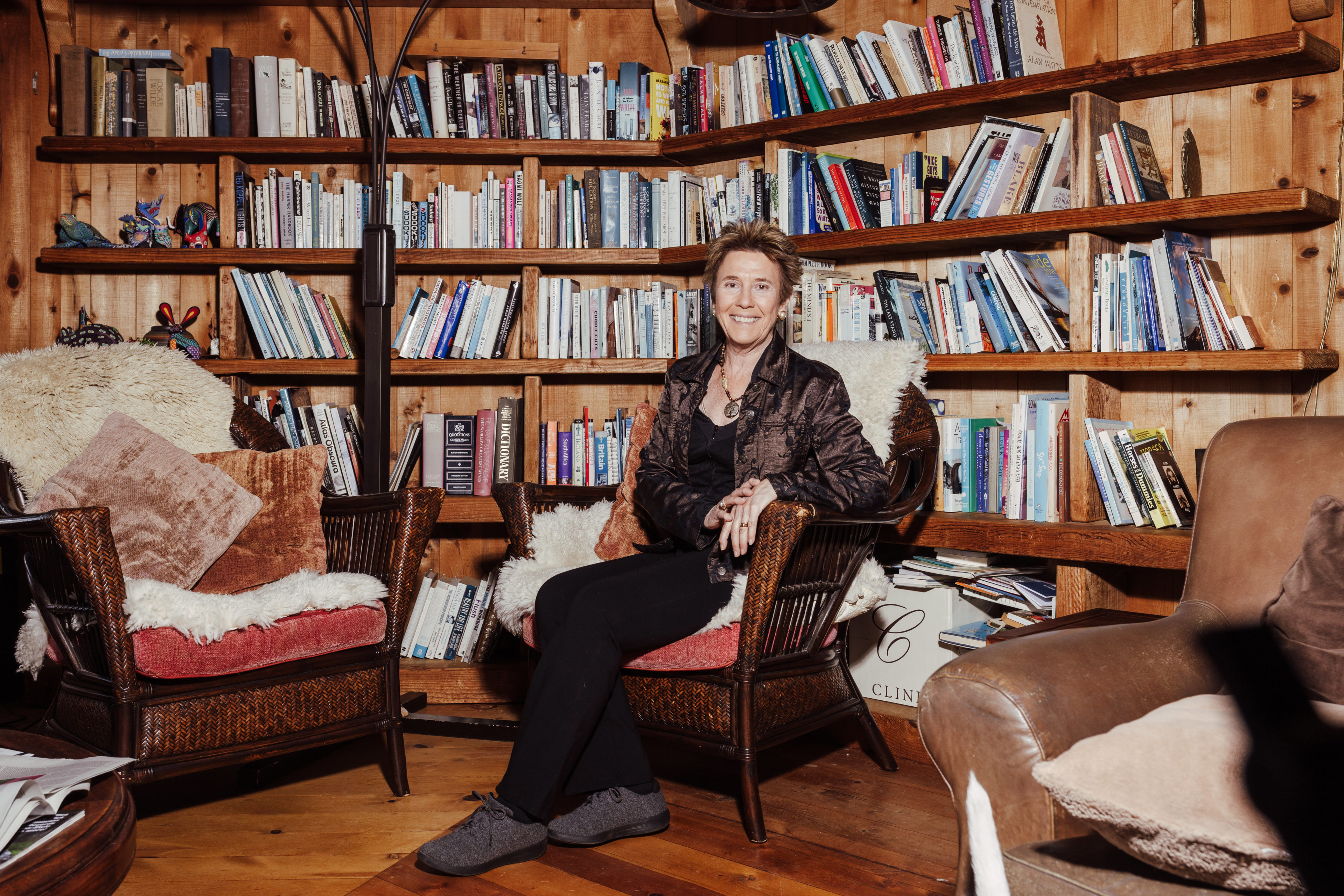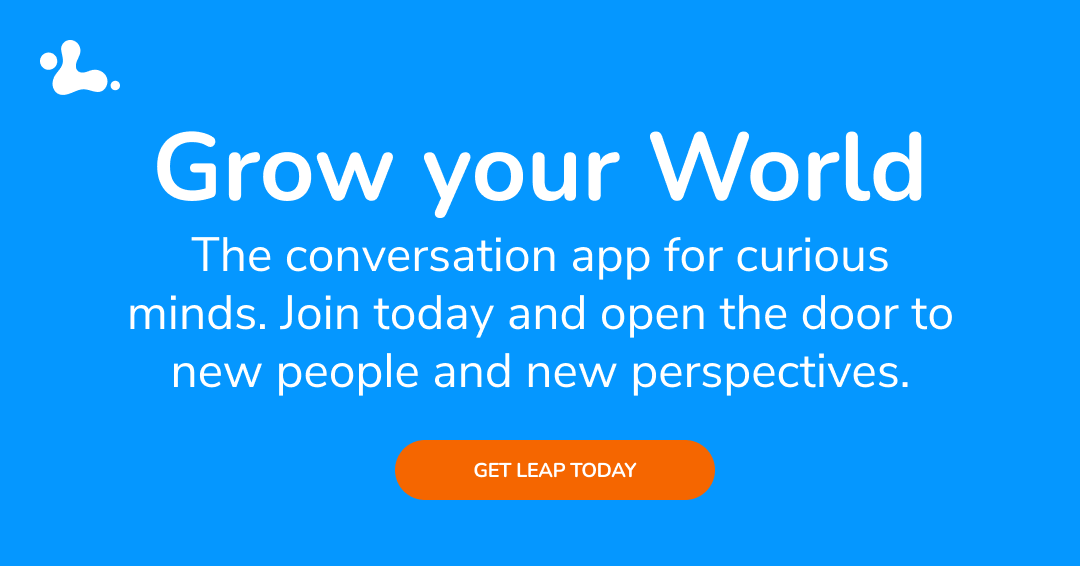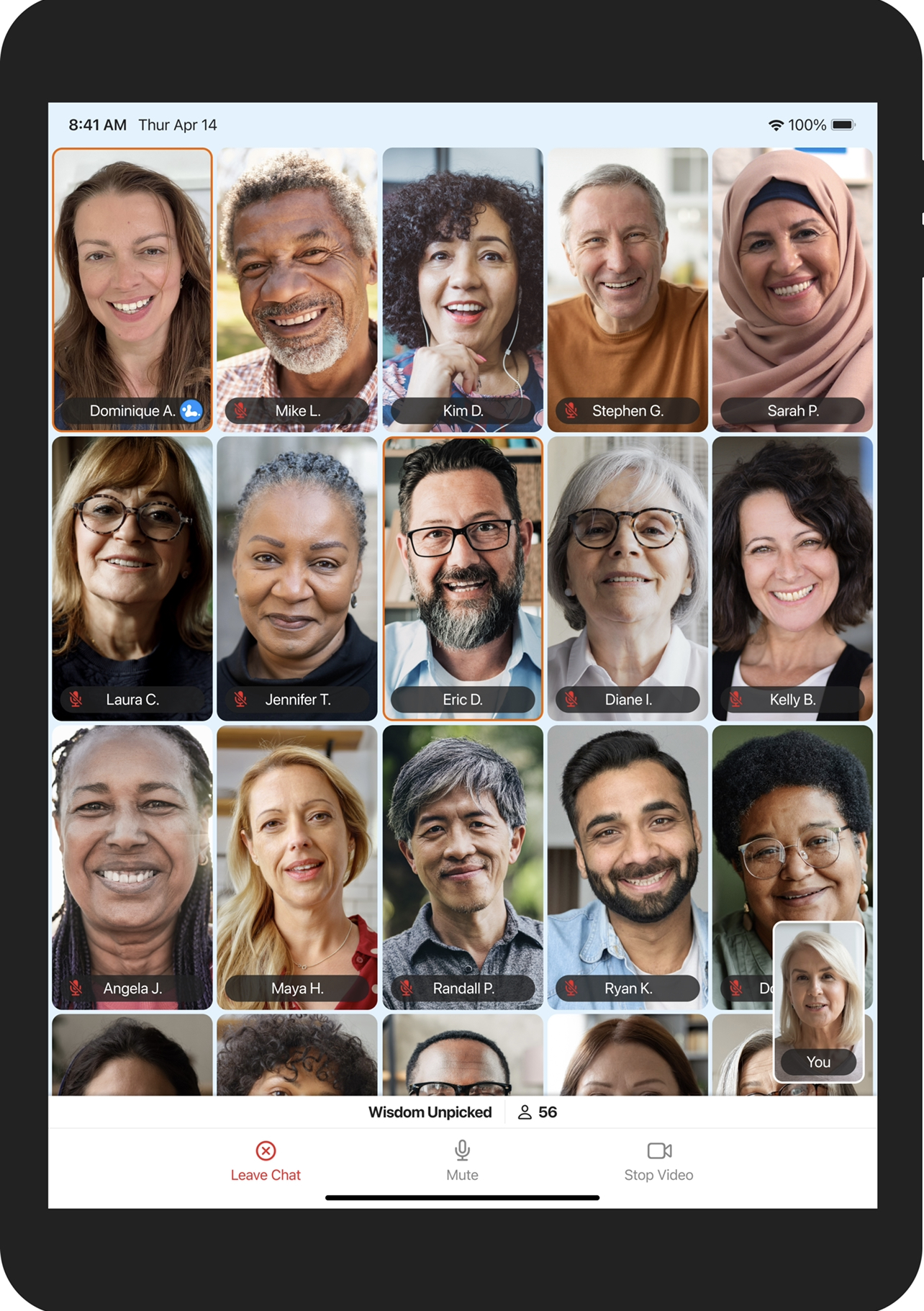When we’re bold and brave enough to step outside of our comfort zones, we’re often richly rewarded. Pauline Tesler knows all about that. At 79, she challenged herself — as an introvert — to join Leap, a new kind of social app which connects people through 20-minute video conversations. Not only did she quickly find herself looking forward to the daily chats, she soon realized she was witnessing the beginnings of an important movement. Here was a new kind of social media that actually felt sociable — sort of like the most lovely and engaging coffee break you ever had.
Check out Leap Chats Here
One of the keys that Leap discovered was finding skilled and sensitive leaders to host their 20-minute chats. This is where Pauline found, much to her introverted surprise, that she excelled. A top lawyer, she specialized in conflict resolution in some of the hardest places we humans have to deal with. To do this work, she brought a combination of curiosity, empathy, and openness — exactly the things that make her a delightfully dynamic Leap Leader. So exactly what is it about this newly-launched social app that is getting people talking – and why has it proved to be so richly rewarding for Pauline?

How old are you?
I’m 79. I turn 80 in September. The final stretch! If you’re not ready to look squarely at aging by the time you hit 80, you’re in serious denial.
Where are you from and where are you based?
I was born just north of Boston and lived there until I was a teenager. Today, I live in San Francisco. At law school one of my professors arranged for me to spend the summer before my final year doing a project there for the Ford Foundation about returning Vietnam veterans and I knew from the first time I saw the Golden Gate Bridge and the bay from the top of one of the hills that I was going to live there.
Why did you go into law?
I’m from a family of lawyers (14 relatives of the first or second degree), so it seemed very familiar, but I was first drawn to law personally when I lived in Chicago in the late sixties during the political upheavals associated with the Democratic Convention of 1968 and the assassination of Martin Luther King. I joined demonstrations but I knew I wasn’t brave enough to risk arrest. Then I learned about a new breed of lawyers: poverty lawyers, law reform lawyers, and I knew this was my path. It simply amazed me that I could go to law school for three years, pass the bar exam, file a lawsuit against the government, and it would have to show up and defend itself and perhaps change its ways!! I practiced that kind of law for about seven years after law school; it was extraordinary work and I stand in awe of what is possible in a society when the rule of law is deeply respected.
“At this stage in my life I want to do things I’ve never done before”
Why did you decide to become a Leap Leader?
At this stage in my life I want to do things I’ve never done before. After being in this business of living for almost 80 years, it’s easy to stay within your strong suit but I wanted to stretch myself. Leap is an adventure into uncharted territory for me. You wouldn’t know it but I’m introvert, so I never imagined this was something that would be a good fit, but the concept really grabbed me.
Can you tell us a little bit more about Leap?
Leap is a social experience anchored in good conversations with a randomly-assigned and very diverse small group. You download the free Leap app and you get access to a rich menu of 20-minute video chats on specific topics including food, travel, movies, poetry, storytelling, photography, music, “what if” imaginative questions, and much more. The list is constantly changing and expanding, and you’ll find a variety of options that take place every day, hosted by Leap Leaders. The rules are elegantly simple: be transparent, be curious, be kind. What a concept for a new kind of social media! The groups are kept really small to enable meaningful connections, so you’ll usually be in a room with just three or four others. One of the things that I think is really brilliant about the chat idea is that all of them are just 20 minutes long. 30 minutes is a commitment, but 20 minutes is a lark.
What is your favorite thing about leading a Leap chat?
The surprise element of it all. Some of the guests who come to my chat are people who I might hesitate to talk to or who I would never know under normal circumstances — and yet here we are enjoying each other’s company. I find that just delightful.
How do you get people to engage with each other?
I try to put a lot of thought and imagination into the process of selecting the weekly prompts I prepare. I’ve become more intuitive about the likelihood of the conversation leading to delight or curiosity or self-reflection. That’s what I’m aiming for every week.
Leading Leap Chats
How does your past in conflict resolution help you in leading Leap chats?
I had my customary performance anxiety before I hosted my first chat, but I soon realized that facilitating these informal conversations was something I already was unusually well-equipped for. As a litigator, you learn to stand up in a courtroom in front of a gathering of strangers — you get interrupted by judges who may even insult you in front of a lot of people, and the job description requires you to smile and say, “Thank you, Your Honor.” And of course, my clients are all going through the most stressful of life transitions, with all the accompanying emotional intensity. It’s second nature for me to handle challenging people in a constructive manner and to guide people from the negative to the positive. So there’s nothing unexpected anyone could throw at me in a friendly little 20-minute Leap conversation that I can imagine being unable to handle.

Do you have any favorite stories you could share with us about your Leap experience?
Some of the most charming and also funniest comments came in response to this prompt: “Why do people love their animals so much? And are our animals capable of loving us back?” It’s the way people gave their answers with such utter conviction and feeling, and the kindness with which the others honored every person and answer — especially the young man who was quite certain that his komodo dragon (a reptile that lacks the brain structures required to feel emotion) loved him back, though the woman who described how her cockatiel expresses jealousy was a close second. And then one of my regulars, a dyed-in-the-wool contrarian, piped up, “If I were hungry and you promised me a steak every time I appeared to like you, I’d put on the best performance of love you could possibly imagine.”
Icebreakers
Your chat is once a week and is called “Icebreakers.” Could you tell us a little bit about what you discuss?
The name Icebreakers comes from the talking prompt each week which is designed to spark conversation no matter how shy or unimaginative one may be. The question of the week aims to spark curiosity and cause people to look within in a way that isn’t at all heavy or scary. I originally got the idea from a man who was doing research into artificial intelligence and teaching a computer what kinds of questions humans like to talk about. The results of his experiment are online and I found them so intriguing. At first I used his AI questions a lot, but now it’s more organic. One question almost always sparks ideas for others.
What do your chat members get from your talks?
It appears to me that they find delight and real human connection. They also learn things. Not things like math or literature, but they learn about human nature and experience from a very pragmatic starting point of ‘who am I?’ and ‘who are you?’ and ‘what do we have in common about this interesting thing that we’ve been asked to talk about?’
Is it a regular group that is the same people week after week?
There is a core of regulars but new people come along all the time, too.
How has Leap changed your life?
I’ve met remarkable people, not just in the chats but in the organization itself. Leap is made up of a group of energetic, enthusiastic, and extremely gracious people who are having a grand time creating something together. Working with women in a start-up focused on pro-sociality, kindness, curiosity, and transparency is the perfect fit for me.

What do you get personally from being a Leap Leader?
On the chats, people show up from all over the world that I would never otherwise meet or talk with. The ground rules are so lucid and straightforward — it’s a very positive way to spend 20 minutes. It’s the emotional and energetic equivalent of the most interesting coffee break you ever had.
“We’re doing remarkable and deep work together and building community in the process”
How have you seen our sense of community changing since the pandemic started in 2020?
I think it’s both shrunk and expanded. There was so much fear, especially in the early days. You couldn’t do the ordinary things that we all took for granted — meeting someone for lunch, or even stopping and talking to neighbors. On the other hand, some of the workshop and seminar ideas I had to come up with as substitutes for my in-person programs could not ever have worked except online. The people who show up to my online seminars are from all over the planet. We’re doing remarkable and deep work together and building community in the process.
What advice would you give someone 50+ who wants to find their community?
Come to Leap and discover what kinds of things you love to talk about and think about with other people. Then you have yourself a roadmap for following your bliss. There are chats about food and photographs and travel and music and it’s a way of exploring who you are if you’re not having to go and sit at a desk anymore. If you find out more about what you love, then you can go out into the world and discover others who share your passion — the members of your tribe.
Photography by: Boris Zharkov
LEAVE A REPLY
The ideas expressed here are solely the opinions of the author and are not researched or verified by AGEIST LLC, or anyone associated with AGEIST LLC. This material should not be construed as medical advice or recommendation, it is for informational use only. We encourage all readers to discuss with your qualified practitioners the relevance of the application of any of these ideas to your life. The recommendations contained herein are not intended to diagnose, treat, cure or prevent any disease. You should always consult your physician or other qualified health provider before starting any new treatment or stopping any treatment that has been prescribed for you by your physician or other qualified health provider. Please call your doctor or 911 immediately if you think you may have a medical or psychiatric emergency.
AUTHOR

We will never sell or give your email to others. Get special info on Diet, Exercise, Sleep and Longevity.



Many thanks, David, for capturing my thoughts so accurately and succinctly. Just one slight after-the-fact tweak is that I’m not yet retired from working in conflict resolution and I have no plans to do so. But cutting back some, to allow room for stretching out of my comfort zone, is very much on the front burner!
I like your newslwetter! Here’s what would work even better. I print newsletters like yours to carry with me to read during wait times at appointments. I also print them to pass along those with low vision who could never read this on line. It would be helpful if you make the newsletter easier to print by adding page # or titles at the top of each page. Thanks.